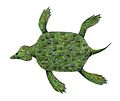| Colymbosaurus Temporal range: Callovian-Tithonian, ~165–145 Ma PreꞒ Ꞓ O S D C P T J K Pg N | |
|---|---|

| |
| Sacral vertebra (left) and humerus (right) of Colymbosaurus sp. | |
| Scientific classification | |
| Domain: | Eukaryota |
| Kingdom: | Animalia |
| Phylum: | Chordata |
| Class: | Reptilia |
| Superorder: | †Sauropterygia |
| Order: | †Plesiosauria |
| Family: | †Cryptoclididae |
| Subfamily: | †Cryptoclidinae |
| Genus: | †Colymbosaurus Seeley, 1874 |
| Type species | |
| †Colymbosaurus megadeirus Seeley, 1874 | |
| Species | |
| |
| Synonyms | |
| |
Colymbosaurus is a genus of cryptoclidid plesiosaur from the Late Jurassic (Callovian-Tithonian) of the UK and Svalbard, Norway. There are two currently recognized species, C. megadeirus and C. svalbardensis.
Taxonomy


The first remains attributed to Colymbosaurus were described as a new species of Plesiosaurus, P. trochantericus. The holotype of the species, NHMUK PV OR 31787, a humerus (upper arm bone), comes from the Kimmeridgian Kimmeridge Clay Formation of Shotover, Oxfordshire, England. Richard Owen, however, misidentified the bone as a femur, an identification corrected in an 1871 publication on the geology of Oxfordshire.
In the meantime, other plesiosauroid remains were being described from the Kimmeridge Clay by independent workers. The species Plesiosaurus megadeirus was coined for two partial postcranial specimens in a publication cataloging Mesozoic tetrapod specimens in the collections of the Sedgwick Museum of Earth Sciences at the University of Cambridge. The name Pliosaurus portlandicus was coined for a partial hindlimb from Dorset, while John Whitaker Hulke erected the species Plesiosaurus manselii for an incomplete postcranial skeleton (NHMUK PV OR 40106) from Kimmeridge, Dorset. Harry Govier Seeley came to recognize Plesiosaurus megadeirus as generically distinct, and coined the name Colymbosaurus for the species. He later referred Pliosaurus portlandicus and Plesiosaurus manselii to Colymbosaurus and considered them distinct from C. megadeirus based on the morphology of the epipodials.

A review of all nominal species of plesiosauroids from the Late Jurassic of England resulted in the recognition of one species of Colymbosaurus, C. trochantericus. P. megadeirus, P. portlandicus, and P. manselii were synonymized with C. trochantericus. Because no skull remains were known, Colymbosaurus was considered possibly a senior synonym of Kimmerosaurus based on comparisons with referred material of Kimmerosaurus.
The distribution of Colymbosaurus was extended beyond the UK when the Norwegian "Tricleidus" svalbardensis was recognized as a valid species of Colymbosaurus, C. svalbardensis, based on the holotype, discovered in the winter of 1930-31 in the Agardhfjellet Formation, and more remains from the same formation described in 2012. This assignment, along with the discovery of new plesiosauroids from Svalbard, prompted a new revision of Kimmeridge Clay cryptoclidids. Plesiosaurus trochantericus was declared a nomen dubium, being referable to Colymbosaurus but indeterminate at the species level, while Kimmerosaurus and Plesiosaurus manselii were recognized as distinct. Because of this revision, megadeirus was resurrected as the epithet of the type species of Colymbosaurus.
See also
References
- Gasparini, Z.; Bardet, N. & Iturralde-Vinent, M. (2002). "A new cryptoclidid plesiosaur from the Oxfordian (Late Jurassic) of Cuba" (PDF). Geobios. 35 (2): 201–211. doi:10.1016/s0016-6995(02)00019-0.
- R. Owen. 1840. Report on British fossil reptiles. Report of the Ninth Meeting of the British Association for the Advancement of Science, Reports on the State of Science 43-126
- J. Phillips. 1871. Geology of Oxford and the Valley of the Thames. Clarendon Press, Oxford 1-523
- H. G. Seeley. 1869. Index to the Fossil Remains of Aves, Ornithosauria, and Reptilia, from the Secondary System of Strata, Arranged in the Woodwardian Museum of the University of Cambridge. Deighton, Bell, and Co, Cambridge 1-143
- R. Owen. (1869). Monographs on the British Fossil Reptilia from the Kimmeridge Clay III: contains Pliosaurus grandis, Pliosaurus trochanterius, and Pliosaurus portlandicus. Palaeontographical Society Monographs 22(98):1-12
- R. Owen. (1869). Monographs on the British Fossil Reptilia from the Kimmeridge Clay III: contains Pliosaurus grandis, Pliosaurus trochanterius, and Pliosaurus portlandicus. Palaeontographical Society Monographs 22(98):1-12
- H. G. Seeley. 1874. Note on some generic modifications of the plesiosaurian pectoral arch. Quarterly Journal of the Geological Society of London 30:436-449
- H. G. Seeley. 1892. The Nature of the Shoulder Girdle and Clavicular Arch in Sauropterygia. Proceedings of the Royal Society of London 51:119-151
- Brown, D. S. (1981). "The English Upper Jurassic Plesiosauridea (Reptilia) and a review of the phylogeny and classification of the Plesiosauria". Bulletin of the British Museum of Natural History. 35 (4): 253–347.
- Brown, D.; Milner, A.; Taylor, M. (1986). "New material of the plesiosaur Kimmerosaurus langhami Brown from the Kimmeridge Clay of Dorset" (PDF). Bulletin of the British Museum (Natural History) Geology. 40 (5): 225–234. ISSN 0007-1471. S2CID 56181657.
- ^ Knutsen, E. M.; Druckenmiller, P. S.; Hurum, J. (2012). "Redescription and taxonomic clarification of 'Tricleidus' svalbardensis based on new material from the Agardhfjellet Formation (Middle Volgian)" (PDF). Norwegian Journal of Geology. 92: 175–186.
- Persson, P.O. (1962): Plesiosaurians from Spitsbergen. Norsk Polarinstitutt, Årbok 1961, p. 62-68. Oslo University Press, 169 pp.
- Benson RBJ, Bowdler T. (2014). Anatomy of Colymbosaurus (Reptilia, Plesiosauria) from the Kimmeridge Clay Formation of the U.K., and high diversity among Late Jurassic plesiosauroids. Journal of Vertebrate Paleontology 34(5), 1053-1071.
| Taxon identifiers | |
|---|---|
| Colymbosaurus |
|
- Cryptoclidids
- Callovian first appearances
- Late Jurassic extinctions
- Middle Jurassic plesiosaurs of Europe
- Late Jurassic plesiosaurs of Europe
- Jurassic England
- Fossils of England
- Jurassic Norway
- Fossils of Svalbard
- Agardhfjellet Formation
- Fossil taxa described in 1874
- Taxa named by Harry Seeley
- Sauropterygian genera






